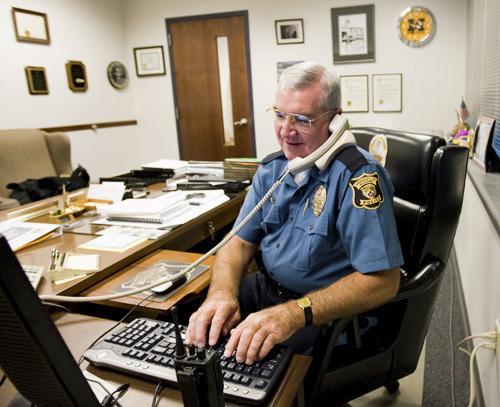
Local police officers have made plans to better understand and work with individuals in the community with mental illness.
According to the Treatment Advocacy Center, there are approximately 356,000 inmates with a serious mental illness in jails and state prisons. This is 10 times more than the approximately 35,000 individuals with serious mental illness remaining in state hospitals nationwide.
According to the the center’s [website,](http://www.treatmentadvocacycenter.org/storage/documents/final_jails_v_hospitals_study.pdf) this makes it seem like the U.S. is using jails and prisons rather than hospitals as a primary facility for people with mental illnesses.
To avoid this, the National Alliance on Mental Illness, an organization “dedicated to building better lives for the millions of Americans affected by mental illness,” has been working with police since 1988 to create healthier and more successful communication between police officers and those with mental illnesses, according to their website.
Two million jail bookings every year involve a person with mental illness, according to the NAMI website. Also, approximately 15 percent of men and 30 percent of women in local jails have a serious mental illness, and one in four of people killed in police involved shootings has a serious mental illness.
“These numbers just begin to show some of the relationships — and consequences — of a sad truth: With our failing mental health system so inadequate, law enforcement agencies have increasingly become _de facto_ first responders to people experiencing mental health crisis,” the NAMI website said.
The video describes the benefits CIT has for police officers, the community and health care facilities.
MU Police Department Maj. Brian Weimer said in an email that MUPD provides basic training to all their employees instructing them on how to respond to people with mental illnesses.
“Many of our officers have also attended crisis intervention training,” Weimer said in an email.
Crisis intervention training is provided by NAMI and helps answer questions like where an officer can take a person for mental health treatment besides jail, especially at night, and how the transfer of custody at the Emergency Department can be sped up so officers can get back to other work.
The video describes the need for CIT for police officers and why it needs to be addressed, and the benefits CIT can have on police officers, the community and health care facilities.
Columbia Police Department Public Information Officer Bryana Larimer said all CPD officers go through first responder training, provided by the National Training and Education Division.
Police officers and citizens can attend a course to learn how to “apply the basic skills of their profession in the context of preparing, preventing, deterring, responding to and recovering from acts of terrorism and catastrophic events,” NTED [stated on their website](https://www.firstrespondertraining.gov/content.do).
“(CPD officers) also repeat specific training on conditions such as excited delirium and mental health,” Larimer said.
NAMI is not only standing up for people with mental illnesses but for the mental health as police officers, as well.
“The stresses on law enforcement officers have grown greater, and we know that there is a disturbing trend in law enforcement suicide,” NAMI [stated on their website](https://www.nami.org/Get-Involved/Law-Enforcement-and-Mental-Health). “With the increase in mass shooting events, it’s become more evident than ever that officer mental wellness needs to be a priority from the day of hire to retire.”